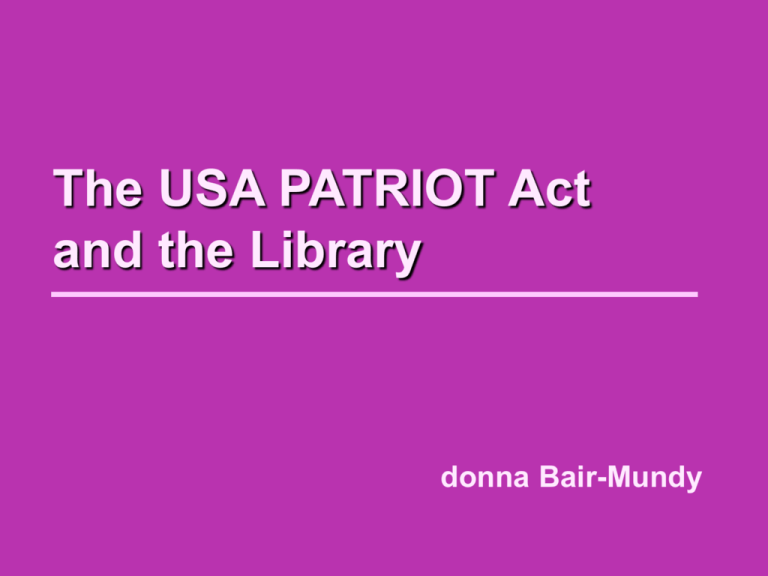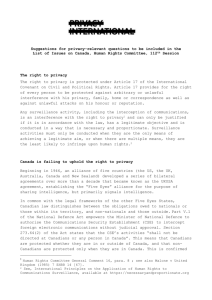patriot_act_infocomm
advertisement

The USA PATRIOT Act and the Library donna Bair-Mundy Discussion question: What is privacy? Why do we need it? Informational privacy - Westin's definition - part 1 Privacy is the claim of individuals, groups, or institutions to determine for themselves when, how, and to what extent information about them is communicated to others. Westin, Alan F. 1970. Privacy and freedom. London: Bodley Head. Informational privacy - Westin's definition - part 2 Viewed in terms of the relation of the individual to social participation, privacy is the voluntary and temporary withdrawal of a person from the general society through physical or psychological means, either in a state of solitude or, when among larger groups, in a condition of anonymity or reserve. Informational privacy - Westin's definition - part 3 The individual's desire for privacy is never absolute, since participation in society is an equally powerful desire. Informational privacy - Westin's definition - part 4 Thus each individual is continually engaged in a personal adjustment process in which he balances the desire for privacy with the desire for disclosure and communication of himself to others, in light of the environmental conditions and social norms set by the society in which he lives. Informational privacy - Westin's definition - part 5 The individual does so in the face of pressures from the curiosity of others and from the processes of surveillance that every society sets in order to enforce its social norms. Desire to avoid being manipulated or dominated wholly by others Release from tensions of life in society requires release from pressure of playing social roles Westin's privacy theory: 4 functions of privacy Personal autonomy Emotional release Self-evaluation Limited & protected communication Need to integrate experiences into Share confidences and meaningful Westin, Alanpattern; F. 1970. Privacy and freedom. London: intimacies only with those one essential for creativity trusts Bodley Head. Individual privacy versus individual secrecy Privacy Allowed and in some cases required for socially-sanctioned acts. Stress reducing. Secrecy Involves socially proscribed acts. Stress inducing. Margulis, Stephen T. 1977. Conceptions of privacy: current status and next steps. Journal of social issues 33(3):5-21, p. 10. Margulis, Stephen T. 2003. Privacy as a social issue and behavioral concept. Journal of social issues 59(2):243-261. Election day Us Us Us Us Them Us On the network news: Ayman al-Zawahiri So you do a search . . . A few days later . . . Fourth Amendment The right of the people to be secure in their persons, houses, papers, and effects, against unreasonable searches and seizures, shall not be violated, and no Warrants shall issue, but upon probable cause, supported by Oath or affirmation, and particularly describing the place to be searched, and the persons or things to be seized. General warrants (1) • • • • No specific individual No specific crime No specific place to be searched No specific items to be sought • Illegal according to Sir Edward Coke’s Institutes of the Lawes of England (first published 1642 and 1644) • Illegality confirmed by Sir Matthew Hale • Illegality confirmed by Sir William Blackstone General warrants (2) • Suspicion of crime related to government revenue • Used against anyone who dared to challenge or limit the authority of Parliament or the crown • John Wilkes (member of Parliament) • Anonymously wrote critical essay published in North Briton • General warrant leads to massive arrests, Wilkes ► Tower of London Writs of assistance • Any customs official could enter “any House, shop, Cellar, Warehouse or Room or other Place...” • Seize unaccustomed goods • Lasted for the life of the sovereign under which it was issued plus six months • According to John Adams, major factor in seeking American Independence Amendment IX (the compromise) The enumeration in the Constitution, of certain rights, shall not be construed to deny or disparage others retained by the people. Discussion question: Why do we need surveillance? Need for surveillance (1) Need for surveillance (2) Need for surveillance (2) Need for surveillance (2) Train Depart Arrive 1 2 2:30 p.m. 6:30 p.m. 3:30 p.m. 8:00 p.m. Beniger, James R. 1986. The control revolution: technological and economic origins of the Information Society. Cambridge, Mass.: Harvard University Press. Surveillance in a transforming society Zuboff, Shoshana. 1988. In the age of the smart machine: the future of work and power. New York: Basic Books. Roles of Surveillance (1) Used to catch the criminals Necessitated by technology Facilitated by technology Used as means to control workers Roles of surveillance (2) Provision of services (Social Security) Allows participation (Voter registration) Protection against threat Means of social control • Discover and rout out deviance • Threat of surveillance used to promote compliance with the law Routing out “deviants” Round-up of Pennsylvania Quakers (1777) Sedition Act of 1798 Espionage Act of 1917 – 1918 amend. Internment of persons of Japanese ancestry—WW II Surveillance - Plague model Highly visible Isolation and observation Social control Foucault, Michel. 1995. Discipline and punish: the birth of the prison. New York: Vintage Books. Surveillance—Panopticon model Jeremy Bentham • • • • Legal theorist Rationalism Utilitarianism Eccentric Jeremy Bentham’s Panopticon cells entry walkway inspector’s lodge Panopticon society Communication Interception 1830s Telegraph invented 1860s Wiretapping during Civil War 1870s Telephone invented 1880s First reports of wiretaps in press 1960s Packet switching Packet sniffers Re-thinking constitutional privacy Hearings on 1964surveillance activities U.S. Senate by federal agencies; Long Subcommittee first looked at IRS 1965 Griswold v. Connecticut 381 U.S. 479 Not on wire-tapping. "Zone of privacy" created by 1st, 3rd, 4th, 5th, and 9th amendments No warrantless wiretapping in criminal cases 1967 Katz v. United States 389 U.S. 347 Congress Acts 1968 The Omnibus Crime Control and Safe Streets Act of 1968 (“Federal Wiretapping Act“), U.S. Code 18 USC Section 2510 et seq. Wiretapping illegal but when crime has been or is being committed law enforcement can, with a warrant, engage in wiretapping for limited periods. Provides judicial oversight for law enforcement wiretapping. National security wiretapping 1972 U.S. v. U.S. District Court for the Eastern District of Michigan “Keith” “the customary Fourth Amendment requirement of judicial approval before initiation of a search applies in domestic security cases” 19 50 19 52 19 54 19 56 19 58 19 60 19 62 19 64 19 66 19 68 19 70 19 72 19 74 19 76 19 78 19 80 19 82 19 84 19 86 19 88 19 90 19 92 19 94 19 96 19 98 20 00 20 02 20 04 20 06 Articles in the New York Times with the word “Orwellian” 90 80 70 60 1974 (major Watergate revelations) 50 40 30 20 10 0 Information Privacy Privacy Act of 1974 Privacy Act of 1974 • Government should be more open about data it keeps on individuals. • Individuals have a right to see information the government collects and to correct data that is incorrect. • Limits on information that can be collected and uses of that information • Limits on external disclosures of information collected FISA 1978 Foreign Intelligence Surveillance Act U.S. Code 50 USC Sections 1801-1863 Electronic mail 1993 ECPA Electronic Communications Privacy Act Addressed the need to protect e-mail. ECPA § 2511. Interception and disclosure of wire, oral, or electronic communications prohibited § 2701. Unlawful access to stored communications ECPA (c) Exceptions.— Subsection (a) of this section does not apply with respect to conduct authorized— (1) by the person or entity providing a wire or electronic communications service; (2) by a user of that service with respect to a communication of or intended for that user; or (3) in section 2703, 2704 or 2518 of this title. September 11, 2001 Congress Acts USA PATRIOT Act Uniting and Strengthening America by Providing Appropriate Tools Required to Intercept and Obstruct Terrorism Public law 107-56; 155 Stat. 272. Path to the USA PATRIOT Act MATA/ATA (DOJ Bill) Rep. James Sensenbrenner H.Res. 264 Asst. Atty. Gen. Viet Dinh House Senate H.R. 2975 USA Act S. 1510 USA Act Sen. Patrick Leahy Judiciary Comm. H.R. 3108 H.R. 3162 USA PATRIOT Act Signed into law by President George W. Bush October 26, 2001 The USA PATRIOT Act H.R. 3162 The Purpose To deter and punish terrorist acts in the United States and around the world, to enhance law enforcement investigatory tools, and for other purposes. The USA PATRIOT Act The Language SEC. 218. FOREIGN INTELLIGENCE INFORMATION. Sections 104(a)(7)(B) and section 303(a)(7)(B) (50 U.S.C. 1804(a)(7)(B) and 1823(a)(7)(B)) of the Foreign Intelligence Surveillance Act of 1978 are each amended by striking `the purpose' and inserting `a significant purpose'. The U.S. Code Sections 104(a)(7)(B) and section 303(a)(7)(B) (50 U.S.C. 1804(a)(7)(B) and 1823(a)(7)(B)) of the Foreign Intelligence Surveillance Act of 1978 are each amended by striking `the purpose' and inserting `a significant purpose'. TITLE 50 > CHAPTER 36 > SUBCHAPTER I > § 1804. Applications for court orders (7) a certification … (B) that a the significant purpose of purpose the surveillance of the is to obtain foreign surveillance is intelligence to obtain foreign information; intelligence information; Investigative powers in US Code – After USA PATRIOT Act 1968 1978 Federal Wiretapping Act Foreign Intelligence Surveillance Act Provisions in the PATRIOT Act Computer communications takeover Hacker’s Computer Intermediary Computer Victim Computer Before PATRIOT Act: Operator of intermediary computer could not allow law enforcement access to hacker’s communication on intermediary Provisions in the PATRIOT Act Roving wiretaps in FISA cases Wiretaps can move from telephone to telephone and jurisdiction to jurisdiction without getting additional warrants Problem: Law enforcement can wiretap any telephone used by a suspect even when not being used by the suspect The USA PATRIOT Act The Complaints— Records vulnerable Section 215—Amending FISA 501(a) The Director of the [FBI] or a designee of the Director ... may make an application for an order requiring the production of any tangible things (including books, records, papers, documents, and other items) for an investigation to protect against international terrorism or clandestine intelligence activities, provided that such investigation of a United States person is not conducted solely upon the basis of activities protected by the first amendment to the Constitution. The USA PATRIOT Act The Complaints—Freedom of Speech Section 215—Amending FISA 501(d) No person shall disclose to any other person (other than those persons necessary to produce the tangible things under this section) that the Federal Bureau of Investigation has sought or obtained tangible things under this section. ALA on government intrusion “The First Amendment’s guarantee of freedom of speech and of the press requires that the corresponding rights to hear what is spoken and read what is written be preserved, free from fear of government intrusion, intimidation, or reprisal.” ALA on the PATRIOT Act “The American Library Association (ALA) opposes any use of governmental power to suppress the free and open exchange of knowledge and information or to intimidate individuals exercising free inquiry…ALA considers that sections of the USA PATRIOT ACT are a present danger to the constitutional rights and privacy rights of library users.” Department of Justice Department of Justice USA PATRIOT Act & Libraries • 2005– FBI presents National Security letter and demands “any and all subscriber information, billing information, and access logs of any person or entity” associated with a specified IP address during a specified period • Librarians fought gag order in court • Librarians speak out Library Awareness Program • Begun during Cold War* • Desire to restrict access to unclassified scientific information by foreign nationals • Desire to recruit librarians to report on “foreigners” • Agent told librarians to report name and reading habits of anyone with a foreign sounding name or foreign sounding accent • Librarians who criticized program were investigated *Curt Gentry gives onset year as 1962: Gentry, Curt. 1991. J. Edgar Hoover: the man and the secrets. New York: Norton., pp. 759-760.




